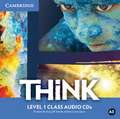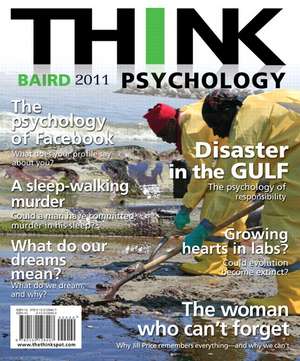Think Psychology: Think
Autor Abigail A. Bairden Limba Engleză Paperback – 30 sep 2010
Din seria Think
-
 Preț: 341.37 lei
Preț: 341.37 lei -
 Preț: 288.56 lei
Preț: 288.56 lei -
 Preț: 378.00 lei
Preț: 378.00 lei -
 Preț: 241.74 lei
Preț: 241.74 lei -
 Preț: 390.27 lei
Preț: 390.27 lei -
 Preț: 377.52 lei
Preț: 377.52 lei -
 Preț: 290.31 lei
Preț: 290.31 lei -
 Preț: 443.00 lei
Preț: 443.00 lei - 19%
 Preț: 517.02 lei
Preț: 517.02 lei -
 Preț: 378.00 lei
Preț: 378.00 lei -
 Preț: 341.37 lei
Preț: 341.37 lei -
 Preț: 378.00 lei
Preț: 378.00 lei -
 Preț: 343.28 lei
Preț: 343.28 lei -
 Preț: 288.78 lei
Preț: 288.78 lei -
 Preț: 257.08 lei
Preț: 257.08 lei -
 Preț: 395.85 lei
Preț: 395.85 lei -
 Preț: 196.00 lei
Preț: 196.00 lei -
 Preț: 257.08 lei
Preț: 257.08 lei -
 Preț: 485.23 lei
Preț: 485.23 lei - 19%
 Preț: 581.69 lei
Preț: 581.69 lei - 19%
 Preț: 518.61 lei
Preț: 518.61 lei -
 Preț: 392.19 lei
Preț: 392.19 lei -
 Preț: 441.08 lei
Preț: 441.08 lei -
 Preț: 387.35 lei
Preț: 387.35 lei -
 Preț: 378.15 lei
Preț: 378.15 lei -
 Preț: 342.47 lei
Preț: 342.47 lei -
 Preț: 485.06 lei
Preț: 485.06 lei -
 Preț: 341.37 lei
Preț: 341.37 lei -
 Preț: 376.93 lei
Preț: 376.93 lei - 19%
 Preț: 581.69 lei
Preț: 581.69 lei -
 Preț: 304.55 lei
Preț: 304.55 lei -
 Preț: 378.49 lei
Preț: 378.49 lei -
 Preț: 257.08 lei
Preț: 257.08 lei - 19%
 Preț: 581.69 lei
Preț: 581.69 lei - 19%
 Preț: 442.59 lei
Preț: 442.59 lei - 19%
 Preț: 442.59 lei
Preț: 442.59 lei -
 Preț: 227.88 lei
Preț: 227.88 lei - 19%
 Preț: 442.59 lei
Preț: 442.59 lei -
 Preț: 304.33 lei
Preț: 304.33 lei - 22%
 Preț: 491.62 lei
Preț: 491.62 lei -
 Preț: 377.60 lei
Preț: 377.60 lei - 19%
 Preț: 581.69 lei
Preț: 581.69 lei -
 Preț: 390.27 lei
Preț: 390.27 lei -
 Preț: 390.27 lei
Preț: 390.27 lei - 19%
 Preț: 520.94 lei
Preț: 520.94 lei - 19%
 Preț: 581.69 lei
Preț: 581.69 lei -
 Preț: 441.08 lei
Preț: 441.08 lei -
 Preț: 360.80 lei
Preț: 360.80 lei -
 Preț: 430.66 lei
Preț: 430.66 lei -
 Preț: 485.06 lei
Preț: 485.06 lei
Preț: 731.54 lei
Preț vechi: 892.12 lei
-18% Nou
Puncte Express: 1097
Preț estimativ în valută:
139.99€ • 145.33$ • 116.73£
139.99€ • 145.33$ • 116.73£
Carte indisponibilă temporar
Doresc să fiu notificat când acest titlu va fi disponibil:
Se trimite...
Preluare comenzi: 021 569.72.76
Specificații
ISBN-13: 9780132128407
ISBN-10: 0132128403
Pagini: 346
Dimensiuni: 226 x 269 x 15 mm
Greutate: 0.73 kg
Ediția:2
Editura: Prentice Hall
Seria Think
Locul publicării:Upper Saddle River, United States
ISBN-10: 0132128403
Pagini: 346
Dimensiuni: 226 x 269 x 15 mm
Greutate: 0.73 kg
Ediția:2
Editura: Prentice Hall
Seria Think
Locul publicării:Upper Saddle River, United States
Descriere
THINK Psychology covers the essentials every introductory psychology student should know. The chapters are briefer than a standard introductory text–allowing for a lower cost to students and using less printed paper. Unlike other brief texts, THINK Psychology includes 18 chapters of content–giving you the flexibility to choose what you want to study without the worry that skipping several chapters will mean leaving out hundreds of pages of content.
THINK Psychology provides currency and relevance through design, current examples and high-interest readings. The readings have been chosen from a range of well respected journals and popular press publications.
THINK Psychology provides currency and relevance through design, current examples and high-interest readings. The readings have been chosen from a range of well respected journals and popular press publications.
Cuprins
Chapter 01: Introduction
Chapter 02: Research Methods
Chapter 03: The Human Brain
Chapter 04: Genetics and Evolution
Chapter 05: Sensation and Perception
Chapter 06: Consciousness
Chapter 07: Learning
Chapter 08: Memory
Chapter 09: Cognition and Intelligence
Chapter 10: Human Development I: Physical, Cognitive, and Language Development
Chapter 11: Sex and Gender
Chapter 12: Human Development II: Social Development
Chapter 13: Emotion and Motivation
Chapter 14: Social Psychology
Chapter 15: Health and Stress
Chapter 16: Personality and Individual Differences
Chapter 17: Psychological Disorders
Chapter 18: Psychological Therapies
Chapter 02: Research Methods
Chapter 03: The Human Brain
Chapter 04: Genetics and Evolution
Chapter 05: Sensation and Perception
Chapter 06: Consciousness
Chapter 07: Learning
Chapter 08: Memory
Chapter 09: Cognition and Intelligence
Chapter 10: Human Development I: Physical, Cognitive, and Language Development
Chapter 11: Sex and Gender
Chapter 12: Human Development II: Social Development
Chapter 13: Emotion and Motivation
Chapter 14: Social Psychology
Chapter 15: Health and Stress
Chapter 16: Personality and Individual Differences
Chapter 17: Psychological Disorders
Chapter 18: Psychological Therapies
Notă biografică
Abigail A. Baird is a Professor of Psychology at Vassar College. She earned her undergraduate degree from Vassar College and both a M.A. and Ph.D. from Harvard University. Following completion of her Ph.D. She was awarded a Post-Doctoral Fellowship at the Center for Cognitive Neuroscience, at Dartmouth College. Her numerous articles and presentations have covered topics such as adolescent brain development, cognitive regulation of emotion, juvenile justice, and manifestations of racial bias in mind brain and behavior.
Abigail's research has received awards from Harvard University, the Society for Research on Psychopathology, and in 2008 the Association for Psychological Science named Abigail a "Rising Star in Psychological Science". Her research has also led her to be elected to several scientific societies including the International Society for Behavioral Neuroscience and the Gruter Institute for Law and Behavioral Research. Abigail has been repeatedly recognized for her excellence in teaching. In 2000 she received Harvard's George Goethals Teaching Prize, and in 2004 was awarded the Class of 1962 Excellence in Teaching Fellowship by Dartmouth College. Her professional accomplishments also include serving as secretary of the Association for Psychological Science, Honorary Faculty Member for the Order of Omega National Honor Society, Invited Faculty to the New York State Judicial Institute and Advisory Board member on the Campaign for Youth Justice.
Abigail's research has received awards from Harvard University, the Society for Research on Psychopathology, and in 2008 the Association for Psychological Science named Abigail a "Rising Star in Psychological Science". Her research has also led her to be elected to several scientific societies including the International Society for Behavioral Neuroscience and the Gruter Institute for Law and Behavioral Research. Abigail has been repeatedly recognized for her excellence in teaching. In 2000 she received Harvard's George Goethals Teaching Prize, and in 2004 was awarded the Class of 1962 Excellence in Teaching Fellowship by Dartmouth College. Her professional accomplishments also include serving as secretary of the Association for Psychological Science, Honorary Faculty Member for the Order of Omega National Honor Society, Invited Faculty to the New York State Judicial Institute and Advisory Board member on the Campaign for Youth Justice.
Caracteristici
THINK Currency. THINK Relevancy. THINK Psychology
· Magazine Design - designed for today's students- clean, open, full- color design with exciting infographics.
· 18 chapters - Informed by the latest research and the most current events.
· Chapter length - average 15 page chapter length.
· Value-Priced - less than half the costs of most introductory Psychology textbooks.
· Current and relevant readings - selections from a range of well respected journals and popular press publications, allow instructors to introduce students to primary source material. See below for a list of these readings. Instructors can also package the APS Current Directions in Introductory Psychology reader, edited by Abigail Baird.
· TheThinkSpot - www.thethinkspot.com. An open-access website with chapter-by-chapter quizzes, downloadable chapter-by-chapter study cards, and on-line flashcards.
· Audio version - downloadable individual audio chapters for $1.99 containing entire chapter. Ideal for students when they are commuting, working out, etc. Downloadable at www.thethinkspot.com
·
Chapter Organization
List of Readings in THINK Psychology
Reading #1: After Research Methods — Chapter 2
Reading #2: After Human Brain — Chapter 3
· Magazine Design - designed for today's students- clean, open, full- color design with exciting infographics.
· 18 chapters - Informed by the latest research and the most current events.
· Chapter length - average 15 page chapter length.
· Value-Priced - less than half the costs of most introductory Psychology textbooks.
· Current and relevant readings - selections from a range of well respected journals and popular press publications, allow instructors to introduce students to primary source material. See below for a list of these readings. Instructors can also package the APS Current Directions in Introductory Psychology reader, edited by Abigail Baird.
· TheThinkSpot - www.thethinkspot.com. An open-access website with chapter-by-chapter quizzes, downloadable chapter-by-chapter study cards, and on-line flashcards.
· Audio version - downloadable individual audio chapters for $1.99 containing entire chapter. Ideal for students when they are commuting, working out, etc. Downloadable at www.thethinkspot.com
·
Chapter Organization
- Each chapter starts a high interest vignette and photograph, both designed to grab student’s attention and pull them into the chapter material
- Opening key questions are provided to frame important topics in the upcoming chapter
- Running Glossary throughout the chapter gives students the list of key terms and definitions
- Streamlined presentation of the material helps ensure students read the content–and don't skip over essential topics
- Chapter Summary outlines the main topics of the chapter–revisiting the opening key questions
- Test Your Understanding at the end of the chapter provides students with a sample test to assess their understanding of the chapter content
List of Readings in THINK Psychology
Reading #1: After Research Methods — Chapter 2
- a 2-part reading —A Picture’s Worth: Partner Photographs Reduce Experimentally Induced Pain
Reading #2: After Human Brain — Chapter 3
- Uncovering “Brainscams”
- Why Ordinary People Torture Enemy Prisoners
- Facebook Profiles Reflect Actual Personality, Not Self-Idealization
Caracteristici noi
For the second edition, we have updated the text’s organization and content based upon feedback from instructors. Highlights of the improvements to the second edition include:
Reorganized Table of Contents. The chapters have been re-ordered to improve the flow of material.
NEW Chapter Openers. All of the chapter openers are new to this edition, including the attention-grabbing introductory vignettes and photos.
NEW End-of-chapter tests for every chapter. All of the end-of-chapter test questions are new and have been checked for accuracy.
Reorganized Table of Contents. The chapters have been re-ordered to improve the flow of material.
NEW Chapter Openers. All of the chapter openers are new to this edition, including the attention-grabbing introductory vignettes and photos.
NEW End-of-chapter tests for every chapter. All of the end-of-chapter test questions are new and have been checked for accuracy.
